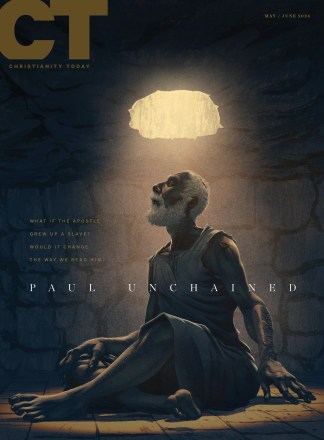Mike Cosper, director of CT Media, reported our March cover story from Jerusalem and Kfar Aza, an Israeli kibbutz that was ravaged by Hamas on October 7, 2023. He explored the political tension between Jews and Palestinians and looked at the origins and growth of anti-Israel and antisemitic ideologies.
Readers were deeply divided about Cosper’s approach to the topic. Some on Instagram thanked Cosper for the “moral clarity” of his “brave, excellent article,” while others were upset that Israel’s past and recent actions against Palestinians were not covered in similar detail or similarly condemned.
Brett Hammond of Louisville, Kentucky, emailed us to say, “I left the article with the belief that Cosper minimized the complicated web of violence and terror that has been present in the Middle East for centuries, much of which Christians have played a direct role in prioritizing.”
But W. H. Dogterom, a professor at Vanguard University in Mission Viejo, California, said the piece “brought matters surrounding this heart-breaking conflict into sharp focus with its emphasis on the ideologies at work—and brought much needed clarity to my misunderstandings.”
In conjunction with his article, Cosper and CT Media are releasing Promised Land, a limited series podcast digging deeper into the history and effects of the Israel-Hamas war.
Alexandra Mellen Conversations editor
The Evil Ideas Behind October 7
As the grandson of a Jewish victim of the Holocaust (Auschwitz) and the son of a Holocaust survivor (Kindertransport), fear gripped my heart when I first heard the reports coming in from Israel that morning. The barbarity of the attack was horrifying, and I realized that much of the world would promptly turn things around and blame Israel. What I wasn’t expecting was fellow Christians and pastors pointing the blame at Israel. Since October 7, Canada has seen the worst cases of overt antisemitism since we turned back ships of Jewish refugees during World War II. Thank you for your commitment to present the truth, even when it is unpopular and difficult to do so.
Daniel J. Winter Toronto, Ontario
While the description of Hamas and its Islamist and nationalist ideology is most accurate and his condemnation of the Hamas killing spree on October 7 is most appropriate, Cosper’s article fails to address the Israeli treatment of Palestinians in the occupied West Bank following the 1967 war and the Israeli settler colonization of the West Bank. Israel definitely has a right to exist. Palestine has a right to exist as well. To spend as much time on the keffiyeh worn by baby Jesus in Bethlehem in a world where European and American Christians have Northern Europeanized Jesus for centuries and where African Americans have worked with a Black Jesus also left me pretty cold. The far left in liberal academia is giving Hamas an almost free pass. Unfortunately, too much of the far right, including parts of American evangelicalism, are giving the Israeli approach to Gaza a similar free pass.
Case Hoogendoorn Chicago, IL
Hackers Try to Take AI to Church
I have trouble imagining how spending more time in the soulless digital world, shepherded by an artificial intelligence, is going to bring me closer to our transcendent Creator. On the other hand, I was pleased to read that the majority of Christians surveyed don’t trust AI to be their spiritual guide. I’m not saying technology has no place in the church. But fellowship and spiritual development are primarily human-to-human endeavors. Let’s be careful about outsourcing them to technology, AI or otherwise.
Jeff Yarnell Beaverton, OR
Political Homelessness Is a Good Start
God brought to my mind 1 Corinthians 15:33: “Do not be misled: ‘Bad company corrupts good character.’” Welcoming bad company into our lives does change our good traits for the worse.
John Osterholm Clovis, NM
Should the Bible Sound Like the Language in the Streets?
The author seems to think that “literal” translations do not reflect or inject the personal beliefs of their translators as opposed to what the paraphrases do. This is absolutely untrue. Every translator is forced by the nature of language and culture to make multitudes of interpretive decisions. The concept of “paraphrase” is an outmoded and inexact one and reflects earlier resistance to new translations that might compete with an old standard. In fact, at times, choosing more “literal” versions may actually introduce greater misunderstanding or lack of accuracy in a reader.
Jenny Giezendanner, Bible translation consultant Southeast Asia
The Bible Was Written to Be Heard and Spoken to Be Read
The missing discussion is how poorly the Bible is often read in church services. I am a drama and speech major, and in my church I became a teacher to those who read Scripture aloud in the services. We talked about slowing down so the audience would have time to receive the words and the different genres that are in the Bible, most of which are read differently from each other. Our readers became able to dramatize the words and thus enhance the understanding of what is being read.
Jenelle Mitchell Kelowna, British Columbia
Behind the Scenes
When writing an article, you often learn much more than shows up in print. Pages of interviews get condensed into a few quotes, and the extra research and notes could likely fill a book. That was the case with my piece “Bad Word,” as I researched controversial Bible translations that try to make God’s Word accessible.
Here are two random facts that didn’t make it: Bertram Gayle, a translator for the Jamaican New Testament, is the first Anglican priest in Jamaica with dreadlocks. He told the Jamaica Gleaner that he grew his locks to connect with his identity, as his father was Rastafarian. And Faith Linton, a board member of the Bible Society of the West Indies who first suggested translating the Bible into Jamaican, is the aunt of the well-known author Malcolm Gladwell. It’s trivia in the most literal sense of the word, but it makes my job always interesting.
Angela Lu Fulton Southeast Asia editor










